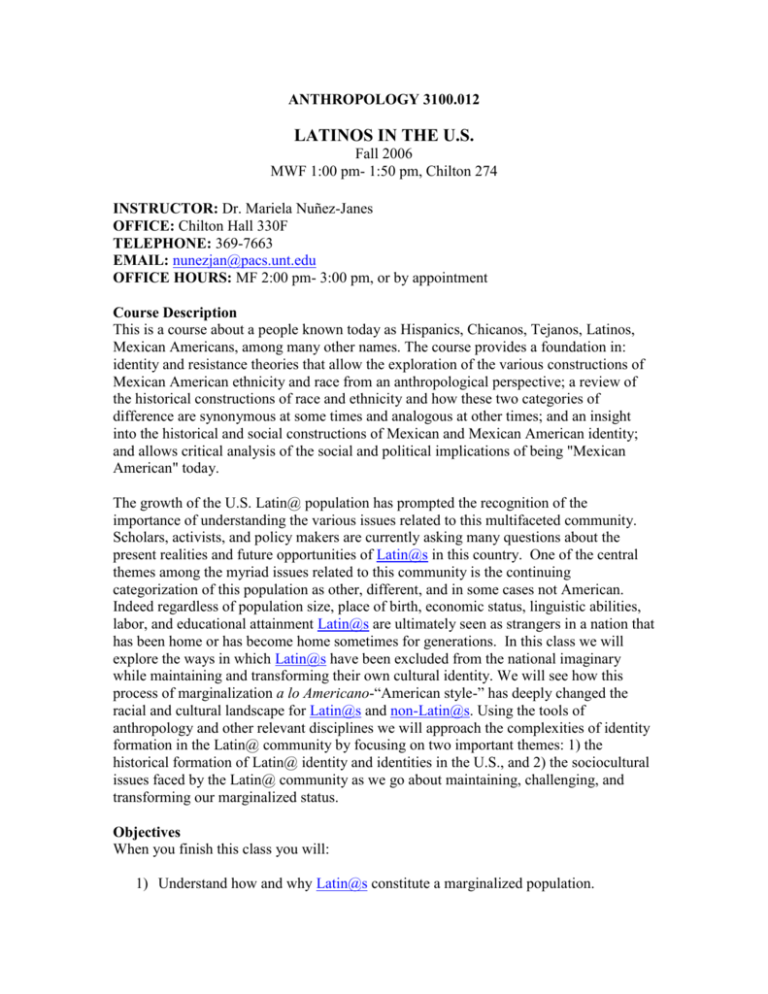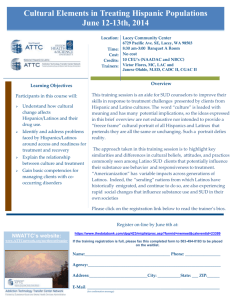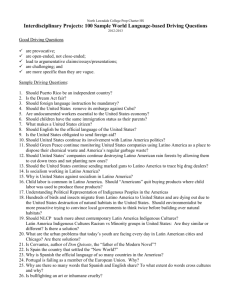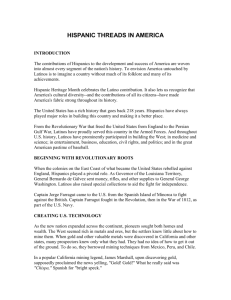Objectives - UNT Anthropology
advertisement

ANTHROPOLOGY 3100.012 LATINOS IN THE U.S. Fall 2006 MWF 1:00 pm- 1:50 pm, Chilton 274 INSTRUCTOR: Dr. Mariela Nuñez-Janes OFFICE: Chilton Hall 330F TELEPHONE: 369-7663 EMAIL: nunezjan@pacs.unt.edu OFFICE HOURS: MF 2:00 pm- 3:00 pm, or by appointment Course Description This is a course about a people known today as Hispanics, Chicanos, Tejanos, Latinos, Mexican Americans, among many other names. The course provides a foundation in: identity and resistance theories that allow the exploration of the various constructions of Mexican American ethnicity and race from an anthropological perspective; a review of the historical constructions of race and ethnicity and how these two categories of difference are synonymous at some times and analogous at other times; and an insight into the historical and social constructions of Mexican and Mexican American identity; and allows critical analysis of the social and political implications of being "Mexican American" today. The growth of the U.S. Latin@ population has prompted the recognition of the importance of understanding the various issues related to this multifaceted community. Scholars, activists, and policy makers are currently asking many questions about the present realities and future opportunities of Latin@s in this country. One of the central themes among the myriad issues related to this community is the continuing categorization of this population as other, different, and in some cases not American. Indeed regardless of population size, place of birth, economic status, linguistic abilities, labor, and educational attainment Latin@s are ultimately seen as strangers in a nation that has been home or has become home sometimes for generations. In this class we will explore the ways in which Latin@s have been excluded from the national imaginary while maintaining and transforming their own cultural identity. We will see how this process of marginalization a lo Americano-“American style-” has deeply changed the racial and cultural landscape for Latin@s and non-Latin@s. Using the tools of anthropology and other relevant disciplines we will approach the complexities of identity formation in the Latin@ community by focusing on two important themes: 1) the historical formation of Latin@ identity and identities in the U.S., and 2) the sociocultural issues faced by the Latin@ community as we go about maintaining, challenging, and transforming our marginalized status. Objectives When you finish this class you will: 1) Understand how and why Latin@s constitute a marginalized population. 2) Know the common and particular themes that contribute to categorize Latin@s as a single ethnoracial group and as distinct national groupings. 3) Be familiar with prominent figures in Latin@ history and scholarship and their contributions. 4) Appreciate the importance of Latin@ studies. 5) Be familiar with some of the methods utilized in Latin@ studies and anthropology. Course Requirements (400 total possible points) 1) Class project: You will participate in a semester class project. The title of the project is: The Latino/a Chicano/a Oral History Project. The class will be divided into teams in order to conduct the project. Each team will be assigned an informant to interview. The teams will produce a written transcript of the interview. The transcripts will be archived for the purposes of documenting the history and experiences of Latinos/as Chicanos/as in Denton and the Metroplex. The class project will culminate in team presentations and an individual paper. Besides learning about Latinos/as, contributing to documenting our experiences, and learning about data collection, the project will give you an opportunity to produce a scholarly work that you can use for the purposes of publication or that you can present at local or national undergraduate conferences. I want you to learn how to be a scholar and to contribute to the scholarship on Latinos/as and Chicanos/as while working with the community. The project will be both exciting and fun but will also require your commitment. You will need to take it seriously and act professionally since you will be in charge of conducting and contributing to a real research project. You will perform the following tasks for the class project: a) NIH training and certificate (10 points): Each student will complete the NIH training and turn in a certificate of completion. Details will be discussed in class. Due on 9/22 b) Transcript of mock interview (15 points): Before each team interviews their assigned informant the class will get a chance to interview Dr. Nuñez-Janes for practice (the date of the mock interview is listed in the course outline). Each student will transcribe a total of 5 minutes of tape-recorded interview and turn in the written transcript. We will discuss transcriptions in class and I will provide you with guidelines. Due on 10/9 c) Scheduling and conducting the interview (1 per team, 25 points): Each team will schedule and conduct a tape-recorded interview with their assigned informant. The teams will contact their informant via email using a formatted letter (I will distribute a copy in class) in order to select a convenient date, time, and place for the interview. Each team is responsible for providing written notice to Dr. Nuñez-Janes of the date, place, and time of the interview Due 10/13 Each team will conduct and tape record the interview. d) Interview transcript (1 per team, 50 points): Each team will produce a typewritten transcript of the interview with their informant. The transcript must follow the guidelines provided in class. In addition, each team will turn in a CD-ROM with the audio file of the interview, a hard copy of the transcript, and an MS Word formatted copy saved on the CDROM. Also each team will turn in the original consent form signed by their informant Due 11/13 e) Team presentation (1 per team, 50 points): Each team will present to the class a summary of their results (see attached guidelines). The presentations will take place at the end of the semester. I will circulate a signup sheet in class. f) Project Participation (graded by project team members, 50 points): Each team member will grade the participation of fellow team members in the various project tasks using the attached guidelines (see syllabus for due date). Sometimes projects conducted in teams turn into individual assignments rather than collaborations and teams are individually rewarded or penalized by the instructor for the actions of team members. To avoid this, your fellow team members will be responsible for this part of your grade. They will assess your performance in the team. The purpose is to encourage responsibility and collaboration. I expect all students to be honest, respectful, and abide by the guidelines when assigning this grade. Each team will be given the opportunity to grade their fellow team members before turning in the project participation grades. The mock project participation grade will not be counted but will give each team member a chance to know what he/she is doing well and what needs improvement. 2) Complete discussion preparation guide and lead in class discussion (50 points): Sign-up to lead discussion. The discussion dates along with the available chapters are listed on the syllabus. A discussant sign-up sheet will be circulated on 9/6. You are responsible for conducting discussion on the date you selected. If you miss the discussion and do not have a valid excuse you will not receive credit. Select one chapter from the ones listed for your selected date and turn in 1 completed discussion preparation guide (25 points) at the end of the class period. Use the guide to lead an in class small group discussion (25 points) once during the semester (you will find the discussion preparation guide attached to the syllabus). 3) Final paper outline (50 points): Each student will turn in an outline of the final class paper following the attached guidelines. Due 11/18 4) Final Paper (100 points): Each student will turn in a final paper that analyzes the interview. The papers must be written individually and must follow the attached guidelines. The due date is listed in the course outline. Your final paper must be turned in no later than 1:00 pm, Chilton 300 5) Reading: Complete the readings listed on the syllabus for the day they are assigned and come to class prepared to discuss them. 6) Attendance: I expect you to be in class having completed all assignments and ready to participate. I also expect your full participation in the class project and your collaboration with team members. Because this course requires your full commitment failure to attend class and collaborate in the project will severely affect your final grade. Please let me know ahead of time if an emergency occurs that prevents you from meeting the attendance requirement on a given day. Grading: All grades will be assigned based on the following grading scheme: 100-89% = A 88-79% = B 78-69% = C 68 -59% = D 58%- = F CLASSROOM POLICIES 1. Since discussion is an essential part of this course please come to class prepared and on time. 2. Please turn off your cell phones and pagers. 3. Do not come into class late or leave early. 4. You are responsible for tracking your own grade progress (see course requirements and grading scheme to help you keep track of available points). If you have questions about your grade come to office hours, make an appointment, or contact me via email. Do not make specific inquiries about your grade in class. 5. No late work will be accepted unless you have a valid documented excuse (documented illness or death in the family). If you miss an assignment and you have a valid documented excuse notify me as soon as possible via phone or email so we can arrange a reasonable time for you to make up the missed assignment. 6. All work must be turned in at the beginning of class unless noted otherwise. I will not accept emailed work. 7. Plagiarism and Cheating: The department of anthropology does not tolerate plagiarism, cheating, or helping others to cheat. Plagiarism is defined as misrepresenting the work of others (whether published or not) as your own. It may be inadvertent or intentional. Any facts, statistics, quotations, or paraphrasing of any information that is not common knowledge, should be cited. Any of these will be reprimanded and can result in an “F” in the course. In addition, I reserve the right to pursue further disciplinary action within the UNT legal system, which may result in your dismissal from the university. For more information on paper writing, including how to avoid plagiarism, and how to use citations, see http://www.unt.edu/anthropology/writing.htm. For information on the University’s policies regarding academic integrity and dishonesty, see the UNT Center for Student Rights and Responsibilities, http://www.unt.edu/csrr/. 8. The Anthropology Department does not discriminate on the basis of an individual’s disability as required by the Americans With Disabilities Act. Our program provides academic adjustments or help to individuals with disabilities in its program and activities. Attempts will be made to meet all certified requirements. REQUIRED READING (UNT BOOKSTORE) Suárez-Orozco, Marcelo M. and Páez, Mariela M., eds. 2002 Latinos Remaking America. Berkeley: University of California Press. (referred to as Latinos in the course outline) REQUIRED RESERVE READING (ELECTRONIC RESERVE, WILLIS LIBRARY) password:latinos6 Anzaldúa, Gloria 1987 “The Homeland, Aztlán/El Otro México.” In, Borderlands/ La Frontera The New Mestiza.” San Francisco: Aunt Lute Books. “El Plan Espiritual de Aztlán” Gonzales, Phillip B. 1993 “The Political Construction of Latino Nomenclatures in TwentiethCentury New Mexico.” Journal of the Southwest 35 (2): 158-185. Guzman, Pablo 1995 “The Party from Palante! Young Lords Party.” In, Roberto Santiago, ed. Boricuas Influential Puerto Rican Writings-An Anthology. New York: Ballantine Books. Hurtado, Aída 1998 “Sitios y Lenguas: Chicanas Theorize Feminisms.” Hypatia 13 (2): 134-161. Negrón-Portillo, Mariano 1997 “Puerto Rico: Surviving Colonialism and Nationalism” In, Frances Negrón-Muntaner and Ramón Grosfoguel, eds. Puerto Rican Jam: Essays on Culture and Politics. Minneapolis: University of Minnesota Press. Nuñez-Janes, Mariela 2002 “Bilingual Education and Identity Debates in New Mexico: Constructing and Contesting Nationalism and Ethnicity.” Journal of the Southwest 44 (1): 6178. Nostrand, Richard L. 1992 “Formative Colonization.” In, The Hispano Homeland. Norman: University of Oklahoma Press. Ramirez, Roberto 2004 “We the People: Hispanics in the United States.” Census 2000 Special Reports. US Census Bureau. http://www.census.gov/prod/2004pubs/censr-18.pdf Torres-Saillant, Silvio 2003 “Inventing the Race: Latinos and the Ethnoracial Pentagon.” Latino Studies (2003) 1: 123-151. Vélez-Ibáñez, Carlos G. 1996 “The American Entrada “Barrioization’ and the Development of Mexican Commodity Identity.” In, Border Visions: Mexican Cultures of the Southwest United States. Tucson: University of Arizona Press. COURSE OUTLINE 8/28 Course introduction 8/30 The “imagined community”? Demographic Trends Assignment: Latinos introduction 9/1 The “imagined community”? Demographic Trends (continued) Assignment: Ramirez, Roberto 9/4 NO CLASS LABOR DAY-DIA DEL TRABAJADOR 9/6 The “imagined community”? Demographic Trends (continued) Assignment: Latinos chapter 1 Sign-up for student led discussion in class 9/8 Latina/o Chicana/o Oral History Project: Project Description 9/11 Student led discussion of Latinos introduction; Ramirez, Roberto; Latinos chapter 1 Assignment: Review Latinos introduction; Ramirez, Roberto, Latinos chapter 1 9/13 Latinos and Race Assignment: Latinos epilogue 9/15 Latinos and Race (continued) Assignment: Torres-Saillant, Silvio 9/18 IRB and NIH 9/20 The border crossed us: Colonization Assignment: Nostrand, Richard 9/22 The border crossed us: Colonization (continued) Assignment: Vélez-Ibáñez, Carlos G. NIH certificate due 9/25 The border crossed us: Colonization (continued) Assignment: Negrón-Portillo, Mariano 9/27 Student lead discussion of Latinos epilogue; Torres-Saillant, Silvio; Nostrand, Richard; Vélez-Ibáñez, Carlos G.; Negrón-Portillo, Mariano Assignment: Review Latinos epilogue; Torres-Saillant, Silvio; Nostrand, Richard; Vélez-Ibáñez, Carlos G.; Negrón-Portillo, Mariano 9/29 Conducting and transcribing interviews Teams will be assigned in class 10/2 Mock interview with Dr. Nuñez-Janes Assignment: Interview Dr. Nuñez-Janes in class. Select a team member ahead of time to ask questions during the interview 10/4 Activism and Movimientos Sociales Assignment: Latinos chapter 6 10/6 Activism and Movimientos Sociales (continued) Assignment: Guzman, Pablo 10/9 Activism and Movimientos Sociales (continued) Assignment: El Plan Espiritual de Aztlán; Hurtado, Aída Transcript of mock interview due 10/11 Student lead discussion of Latinos chapter 6; Guzman, Pablo; El Plan Espiritual de Aztlán; Hurtado, Aída (Dia de la Raza, Columbus Day) Assignment: Review Latinos chapter 6; Guzman, Pablo; El Plan Espiritual de Aztlán; Hurtado, Aída 10/13 Ethnic Labels Assignment: Gonzales, Phillip Team note with interview date, place, and time due in class 10/16 Ethnic Labels (continued) 10/18 Immigration Assignment: Latinos chapter 8 10/20 Immigration (continued) Assignment: Latinos chapter 9 10/23 Immigration: Recent events and proposed reforms 10/27 Immigration: Recent events and proposed reforms Assignment: Anzaldúa, Gloria 10/30 Film-Beyond the Border/ Mas Allá de la Frontera 11/1 Film-Beyond the Border/Mas Allá de la Frontera (continued) 11/3 Student led discussion of Gonzales, Phillip; Latinos chapter 8; Latinos chapter 9; Anzaldúa, Gloria Assignment: Review Gonzales, Phillip; Latinos chapter 8; Latinos chapter 9; Anzaldúa, Gloria 11/6 Analyzing findings: discussion of outline and final paper 11/8 Education Assignment: Latinos chapter 18 11/10 Education (continued) Assignment: Latinos chapter 16 11/13 Education (continued) Assignment: Latinos chapter 19 Interview transcript, CD, and consent form due (place in a manila envelope with your names and team number) Sign-up for team presentations in class 11/15 Film-Fear and Learning at Hoover Elementary Assignment: Nuñez-Janes, Mariela 11/17 Film-Fear and Learning at Hoover Elementary (continued) Assignment: Latinos chapter 17 11/20 Student-led discussion of Latinos chapter 18; Latinos chapter 16; Latinos chapter 19; Nuñez-Janes, Mariela; Latinos chapter 17 Assignment: Review Latinos chapter 18; Latinos chapter 16; Latinos chapter 19; Nuñez-Janes, Mariela; Latinos chapter 17 Final Paper Outline due 11/22 Discussion of final paper and team presentations 11/24 NO CLASS THANKSGIVING BREAK 11/27 Guest speaker, Jose Aponte 11/29 Student presentations 12/1 Student presentations 12/4 Student presentations 12/6 Student presentations 12/8 Student presentations 12/11 Final paper due no later than 1:00 pm, Anthropology office Chilton 300 Note: this syllabus my be subject to changes and/or revisions Discussion Preparation Guide for Student-led Discussions Name_______________________________________________ Date_______________ Chapter__________________________________________ To the student: A. You must fill out this discussion preparation guide and turn it in on the day of the discussion. No exceptions will be made for late papers. The guide will count towards half of the student-led discussion grade. (25 points) B. Use this guide to help you formulate the issues you will like to bring up during the discussion. C. Remember that your role as a discussion leader is to act as moderator. Thus, in addition to having particular issues that you want to address during discussion, your role as moderator also includes making sure that you do this within the class time and that the discussion moves along. 1. Note words that are unfamiliar or are used in a specific way in the reading. Define the word in the context of the phrase where you first saw it and in relation to the main points of the reading. a. b. c. d. e. 2. What ideas seem significant or puzzling to you? Prepare questions about these to ask during discussion. a. b. c. d. e. 3. State the topic of the reading in one or two sentences. What is this chapter/article about? 4. How does the reading relate to other materials you've read in this class and/or in other classes? 5. How does the reading relate to things you, friends, family have experienced and/or to events you are familiar with? 6. What is your opinion of the reading? Provide a reason for your opinion. 7. What did you learn from the reading? Please be specific. Guidelines for completing the interview transcripts Include the following information in the upper left-hand corner of the transcript: Name of team members Date, time, place of interview Gender, age, and year in school of informant Transcription Conventions (use in the transcript) (Adapted from Alessandro Duranti, http://www.sscnet.ucla.edu/anthro/faculty/duranti/audvis/annotate.htm. Based on the transcription conventions developed by Gail Jefferson for the analysis of conversational turns in English conversation -- see Sacks, Schegloff, and Jefferson 1974 or Schenkein 1978 in the References on greetings). Number all lines consecutively. Include the line number in the left margin Example: 1 Informant; I thought it was important to do 2 MNJ; Why do you think it was important? 3 Informant; Because my family kept talking about it Use “informant” to replace the name of the person you are interviewing. Use the first name and last name initials to replace the name of the person(s) conducting the interview Single space utterances by a single speaker and double-space utterances by different speakers. Speakers names should be bolded MNJ; Of course, I am a professor in the anthropology department and I’m teaching a class on Latinos in the U.S. Informant; Can you say a little bit more about your class? Use three dots indicate an untimed pause. Use words between parentheses in the transcripts to represent the best guess of a stretch of talk which was difficult to hear. Team presentation guidelines The presentation will be conducted in class on the date selected by the team. All team members must participate and be present during the presentation to receive full credit The presentation cannot exceed 10 minutes and must be done using Power Point. It must include the following: Name of team and team members A brief summary of your informant's responses What your team learned from the project about Latinos in the U.S. Project participation grading guidelines Your Name: Name of team member you are grading: Please rate your fellow team member on the following: 1) Availability: Was this team member available to perform assigned tasks? 1 2 3 (never available) 4 5 6 7 8 9 10 (always available) 2) Responsibility and promptness: Did this team member carry out and complete tasks in a timely manner? 1 2 (never) 3 4 5 6 7 8 9 10 (always) 3) Leadership: Did this team member volunteer to perform tasks and contributed ideas to the team? 1 2 (never) 3 4 5 6 7 8 9 10 (always) 4) Communication: Did the team member respond to emails, phone calls or other type of team communication on a timely manner? 1 2 3 4 5 6 7 8 9 10 (never) (always) 5) How would you rate the overall participation of this team member in the project tasks? 1 2 (poor) 3 4 5 6 7 8 9 10 (excellent) Total Points: (add up all the scores) Comments: Please provide constructive feedback that addresses the areas that the team member did well and those that could be improved. Give concrete examples if possible. Guidelines for final paper outline Analyze the interview and select a topic from the syllabus and/or readings Write a 1 page type-written and 12 point font outline of your final paper. The paper outline must include: Your name, paper topic, and possible title (5 points) A thesis statement that summarizes what your paper will be about (20 points) Statements in support of your thesis including ideas from readings and lectures and formatted citations using the style of the AAA, see http://www.aaanet.org/pubs/style_guide.htm (20 points) A page with references cited using the style of the AAA (5 points) Guidelines for final paper Your final paper will provide an analysis that will relate the experiences described by your informant with one of the topics discussed in class and/or readings. The paper must be no longer than 5 type-written pages double-spaced using 12 point font. It must include: Separate title page with the title of the paper, your name, course title and number, semester, your email address (I will use your email address to contact you after the semester is over for the purposes of possible publication and/or conference participation) (10 points) Thesis statement and brief biographic sketch of your informant. Remember not to include name or personally identifiable information of informant (30 points) Analysis that clearly links an aspect of your informant's experiences with a topic discussed in the syllabus. This analysis must include relevant citations (follow AAA's citation style) of the class lectures and readings that show your understanding of the topic. It must be written in a way that supports and develops your thesis statement (50 points). A page listing the references cited in your paper (follow AAA's citation style) along with a brief acknowledgment of your team members and the class project (10 points) Team Names Denis Chavez Rudolfo Anaya Chela Sandoval Jose Marti Simon Bolivar Dolores Huerta Americo Paredes Frida Kahlo Isabel Allende Gloria Anzaldua Sandra Cisneros Arturo Sandoval Guillermo Gómez-Peña Celia Cruz Tito Puente Ruben Blades Lalo Alcaraz








